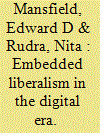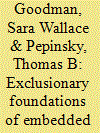| Srl | Item |
| 1 |
ID:
178573


|
|
|
|
|
| Summary/Abstract |
In recent years, the volume and intensity of attacks on globalization have been steadily rising. It is frequently argued that the antiglobalization backlash stems from strains that have been placed on the compromise of embedded liberalism. We argue that existing research underemphasizes how technological change and the digital revolution have contributed to these strains. Global value chains facilitated by the digital revolution have linked technology in advanced industrial countries to low-cost labor in developing countries, precipitating distributional losses for low-skilled labor in the industrial world. Further, the digital revolution has led to regulatory challenges involving both capital and labor. We argue that, as a result, governments face both mounting opposition to globalization and heightened difficulty in supporting the programs and policies necessary to buffer the adverse domestic effects of globalization and maintain support for embedded liberalism.
|
|
|
|
|
|
|
|
|
|
|
|
|
|
|
|
| 2 |
ID:
178567


|
|
|
|
|
| Summary/Abstract |
Analyses of embedded liberalism have focused overwhelmingly on trade in goods and capital, to the exclusion of migration. We argue that much as capital controls were essential components of the embedded liberal compromise, so too were restrictions on the democratic and social rights of labor migrants. Generous welfare programs in labor-receiving countries thrived alongside inclusionary immigration policies, but this balanced arrangement was only tenable if migrants were politically excluded in their destination countries. That is, embedded liberalism abroad rested on exclusionary political foundations at home. In bringing together the IPE literature on the “globalization trilemma” with the comparative politics of citizenship, we provide a novel account of how embedded liberalism worked politically, with implications for current debates about the fate of the liberal order in a time of populist resurgence.
|
|
|
|
|
|
|
|
|
|
|
|
|
|
|
|